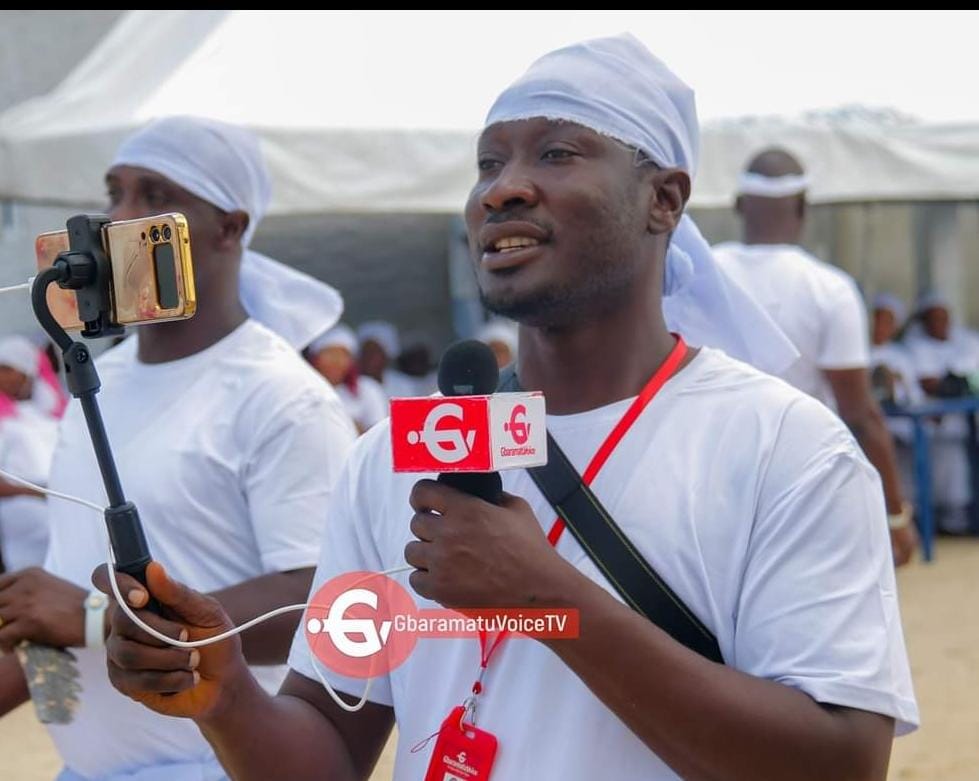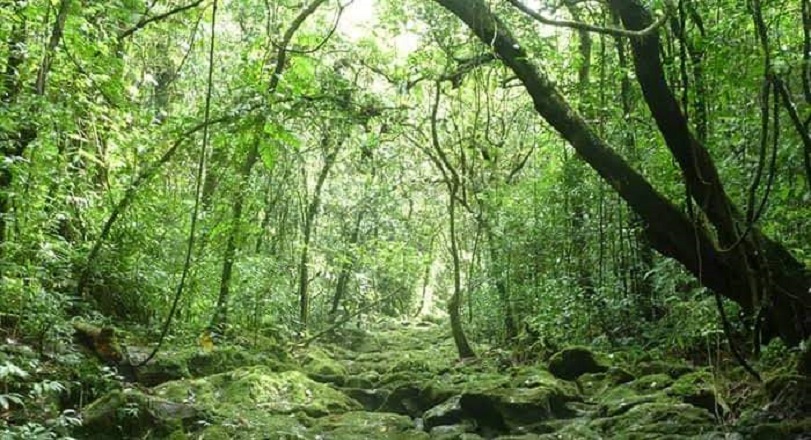Feature/OPED
A Cultural Journalist’s 15 years of Research on Ijaw Culture and Worship

By Jerome-Mario Utomi
No man, according to Aristotle, chooses anything but what he can do himself. And thus, choice is limited to the realm of things humanly possible. Aristotle further stated that there is no choice among impossibilities. Choice, by its very nature, is free. A necessitated choice is not a choice at all but a great sacrifice, he concluded.
The above lines from great Aristotle amply capture the ‘fate’ or better still the position of Asiayei Enaibo, Bobogbene community, a Warri, Delta state-based journalist who made a necessitated choice/sacrifice by opting out of conventional journalism to explore formation that is supremely foundational to knowledge and cultural production processes. This knowledge in question focuses on the heritage, belief, and values of the true origin and practical belief to commune with the gods and ancestors.
Adding context to the discourse, Asiayei Enaibo hails from Ayakromo, Burutu Local Government Area of Delta State. He is a thoroughbred journalist with great insight into political reportage as well as laced with in-depth knowledge of socioeconomic issues, development and analysis. Also working in his favour is the fact that he is well-foresighted and naturally at home when it comes to broadcast and any other form of commentary.
Despite these virtues, attributes and proficiency needed by the global community, Asiayei Enaibo, in what could be described as extraordinary sacrifice and response to a call for the highest level of spirituality, opt for little-known and less attractive cultural communication where he has since become both sign and symbol to the hearth of traditional worshippers in the whole of Ijaw land and Niger Delta region in general.
Also newsy is the awareness that Asiayei has remained resolute and laced with an unwavering commitment to this spiritual call for the past 15 years, precisely since 2009.
Like a self-willed prisoner, Enaibo has traveled a long windy road to be here.
Most profound about the country is his deep understanding of Ijaw in the African traditional worship institution which has given him both leverage and latitude to deconstruct negative arguments that posture the African traditional worship system as evil. He has not only changed the narrative but vehemently defended African culture and traditional worship system at local and international gatherings.
For instance, he believes and has argued beyond reasonable doubt that the consciousness of Ijaw spirituality hangs on the powers of Egbesu and Egbesu, according to him, is the deity of justice of the Ijaw people of the Niger Delta region. Egbesu, he said is also perceived as the spiritual foundational force for combating evil and cleanses them at every point of confession for forgiveness. The Egbesu force can only be used in defence or to correct an injustice, and only by people who are in harmony with themselves and the universe.
‘Before the coming of the Western religion, Egbesu worship had been in existence. The god of warfare and justice, Egbesu, is regarded as a divine guardian who protects the Ijaw people from their enemies. He is often invoked before battle and is believed to grant victory to those who fight with righteousness and integrity, those who go to the temple of Egbesu must go with a clean heart. If you abore any evil at the point of entrance, there is a pot for purification to cleanse and wipe every evil thought away’.
Enaibo’s investment of his time and talent in cultural journalism has equally seen him widely travelled on a fact-finding mission to the entire Ijaw nation, an ethnic nationality which happens to be the fourth largest in the country.
He has not only made friends and commanded followership but moved severally from Ondo to Edo state, Rivers to Bayelsa down to Akwa Ibom and back to Delta state among others, researching and documenting the undiluted fact that centres on Ijaw history, traditional worships and other critical knowledge areas-as well as participated in high profiled seminars and conferences that has Ijaw culture and traditional worship as its thrust.
This has undeniably made him a reference point for the present and future generations when it comes to Ijaw affairs and in the world of cultural journalism/communication in the Niger Delta region and the nation in general.
However, even as this feat is celebrated, it will on the other hand elicit the questions; first and very importantly, what got Enaibo fixated in this area of communication? Why is cultural communication in the face of other attractive areas of journalism that are considered more lucrative? Why not areas such as political and socioeconomic affairs?
Providing an answer to these questions recently, the Bobogbene/Ayakromo community-born creative writer described himself as a privileged channel chosen by the gods to write their stories, noting that cultural journalism depicts the cultural sensibility of the people and the consciousness of their true identity as their heritage, belief, and values to their true origin and practical belief to commune with the gods of their forefathers.
He said that as a cultural journalist, I feel awakened to the core values of our people. It is the root pride of people who believe in their existence and perception of the God of their creator. I am culturally conscious of the belief practice and worship of the ancestral God of the Ijaw land.
On Ijaw traditional worship, Enaibo has this to say; the great Egbesu is our being that protests the land in time of war, justice, and freedom as an indomitable supernatural power solely for the Ijaws beyond conquest in time of war for justice. Yes, the power manifestation of this spiritual being was deeply abandoned by the coming of the Christian faiths that painted everything in derogatory mental brainwashing. And the gods elude us, but now with Tompolo, there is a new paradigm shift of root consciousness to our Spirituality.
‘Tompolo who I often referred to as gods, begotten son of Ijawland communicates to the gods in the language of metaphysics and gods change its story and that has been with our forefathers. There is no new formation, but what has been. With morality and sincerity, there is no mistake in the story of the gods, and there is no deception, once you hand twist the wish of the land the gods dare you with death or you make an urgent confession and please for forgiveness at the sacred Temple of Egbesu or any other power you have offended’.
‘And it is a few journalists in Ijaw land like myself as part of this entity that the gods reveal their potential to. To me, in any temple I visit, I write their stories with ease because this is an old institution I was born into. Many because of this dislike distance themselves from Cultural Journalism’.
‘From masquerade stories to gods of the land that protect us, to God and man, when we understand the missing bridge, the better prosper us as we have returned to our original paradise lost and regain with full glory as the examples of Tompolo and other high priests of Ijaw land. Writers like Enaibo have an internal soul personality that attracts this energy, purity of thoughts at the same frequency beyond the mundane world,’ he concluded.
Essentially, going by his age and physical appearance, Asiayei in my view, is by no means an old man. But his understanding of and competence in promoting the culture of his people have conspired to confer on him, the enviable title; ‘Talking Drum of Niger region’ by his friends and admirers because of his creative writing prowess. He has proved that history does matter and that ordinary calculation can be upturned by extraordinary personalities.
Enaibo’s regular intervention in Ijaw culture and worship has blown fresh wind to the discourse in ways that accelerate the process of the reemergence of a fully functional historical document that will be trusted by both present and future generations.
Regardless of what others may say, the new awareness created by the cultural journalist can engineer disruptive as well as constructive ideas that will help shatter set patterns of thinking, threaten the status quo or at the very least raise people’s concern to further question time-honoured historical accounts.
A circle of learning and empowerment has been created by Enaibo’s 15 years of unbroken commentary that allows the people of the Ijaw nation to see things that others cannot see.
Another reason why Enaibo’s deep dive into Ijaw cultural journalism should be appreciated is that in population, Ijaws are the fourth largest ethnic nationality in the country. And the people, in material terms, have, through hard work, and planning, established themselves in all sectors-finance, science/technology, sports and education among others.
The above achievements notwithstanding, the people would have needed, yet, another generation to correct some sloppy traditional worship accounts that have invaded so many literary works currently in the public domain if not because of Enaibo’s correctional
Jerome-Mario Chijioke Utomi is the Programme Coordinator (Media and Public Policy) for Social and Economic Justice Advocacy (SEJA), Lagos. He can be reached via je*********@***oo.com/08032725374
Feature/OPED
The Hidden Workforce of the 2026 Access Bank Lagos City Marathon

When the final runner crossed the finish line at the 11th edition of the Access Bank Lagos City Marathon (ABLCM), the applause began to fade. But for hundreds of workers across Lagos, the real work was just beginning.
Major highways had been closed to facilitate the event. Tens of thousands of runners moved through the city in a coordinated surge of athletic endurance. Thousands of bottles of water and energy drinks were distributed, alongside sachets containing essential medical supplies and medication. The race route itself was meticulously prepared, lined with banners, barricades, medical tents and precision timing systems that ensured safety, organisation and accurate performance tracking from start to finish.
What followed was the part that a few cameras lingered on, yet it remains one of the clearest indicators of institutional progress.
Within minutes of the race conclusion, coordinated sanitation teams fanned out across the marathon corridor. Their work went beyond sweeping. Waste was systematically sorted. Plastic bottles were separated from general refuse. Sachets were gathered in bulk. Collection trucks moved along predefined routes, ensuring rapid evacuation of waste. Temporary race infrastructure was dismantled with quiet precision.
In a megacity like Lagos, speed is a necessity. Urban momentum cannot pause for long. The ability to restore order quickly after an event of this magnitude reflects operational discipline across interconnected systems, municipal authorities, environmental agencies, private waste management partners and event coordinators.
Globally, large-scale sporting events are no longer evaluated solely by participation numbers or prize purses. Sustainability has emerged as a defining metric. Environmental responsiveness is now a core measure of credibility. Cities seeking tourism growth, foreign investment and international partnerships must demonstrate that scale does not compromise responsibility. The 2026 marathon provided a compelling case study in this evolution.
The clean-up operation itself generated meaningful economic activity. Temporary employment opportunities emerged for sanitation workers and logistics personnel. Recycling partners engaged in material recovery, reinforcing circular economy value chains. What was once viewed as routine waste disposal has evolved into a structured ecosystem of environmental services, a sector of increasing importance in modern urban economies.
This level of sustainability was the result of deliberate planning. Effective post-event recovery requires route mapping, waste volume projections, coordination between sponsors such as Access Bank Plc and municipal bodies, contingency planning for congestion points and clear communication protocols.
Each edition of the marathon has built on lessons from the last. International participation has expanded. Accreditation standards have strengthened. Media visibility has grown. Most importantly, environmental management has become embedded in the marathon’s operational framework rather than treated as an afterthought.
Progress rarely arrives in dramatic leaps, it advances through incremental improvements, refined systems and institutional learning. Just as elite runners close performance gaps through disciplined training, cities strengthen their global standing through consistent operational excellence.
The 2026 marathon, therefore, tells a story that extends far beyond athletic achievement. It is a story of coordination, sustainability as strategy rather than slogan, and the often unseen workforce, sanitation workers, planners, volunteers, security officials and environmental partners, whose discipline sustains the spectacle.
Because in the end, global cities are judged by how well they host and how responsibly they restore. On the marathon day in Lagos, it was the runners who demonstrated endurance and the systems, and the people behind them, who ensured that when the cheering stopped, the city kept moving.
Feature/OPED
N328.5bn Billing: How Political Patronage Built Lagos’ Agbero Shadow Tax Empire

By Blaise Udunze
Lagos prides itself as Africa’s commercial nerve centre. It markets innovation, fintech unicorns, rail lines, blue-water ferries, and billion-dollar real estate. Though with the glittering skyline and megacity ambition lies a parallel state, a shadow taxation regime run not from Alausa, but from motor parks, bus stops, and highway shoulders. They are called “agberos.” And for decades, they have functioned as Lagos’ unofficial tax masters.
What began as loosely organised transport unionism mutated into a pervasive and often violent system of extortion. Today, tens of thousands of commercial buses, over 75,000 danfos according to estimates by the Lagos Metropolitan Area Transport Authority, ply Lagos roads daily. Each bus is a moving ATM. Each stop is a tollgate. Each route is a revenue corridor.
Looking at the daily estimate from their operations, at N7,000 to N12,000 per bus per day, conservative calculations show that between N525 million and N900 million is extracted daily from drivers. Annually, that balloons toward N192 billion to N328.5 billion or more, money collected in cash, unreceipted, unaudited, unaccounted for. This illicit taxation on an industrial scale did not emerge in a vacuum.
The reality today is that to understand the scale of the problem, one must confront its political history. It was during the administration of Bola Ahmed Tinubu as Lagos State governor from 1999 to 2007, who is now the President, that the entrenchment of transport union dominance and motor park patronage deepened.
Under his political machine, transport unions became not just labour associations but mobilisation structures, formidable grassroots networks capable of crowd control, voter turnout engineering, and territorial enforcement. In exchange for political loyalty, street influence translated into operational latitude.
Motor parks became power bases. “Area boys” became enforcers. Union leadership became politically connected. What should have been regulated associations morphed into revenue-generating franchises with muscle.
The system outlived his tenure. It institutionalised itself. It professionalised. It is embedded in Lagos’ political economy.
And today, it thrives in broad daylight. Endeavour to visit Ajah under bridge, Ikeja under bridge, or Mile-2 along Ojo at 6:00 a.m. Watch drivers clutching crumpled naira notes. Observe men in green trousers and caps marked NURTW weaving between buses, collecting what drivers call òwò àrò, or evening as òwò iròlè money taken from passengers.
A korope driver shouts, “Berger straight!” His bus fills. The engines rumble. But before he moves, he must pay. If he refuses? The side mirror may disappear. The windscreen may crack. The conductor may be assaulted. The vehicle may be blocked with planks, and if they resist, the conductor or driver may be beaten. Movement becomes impossible. It is not optional.
This is common across Lagos, especially amongst drivers in Oshodi, Obalende, Ojodu Berger, Mile 2, Iyana Iba, and Badagry, and describes a three-layered structure ranging from street collectors, area coordinators, and union executives at each location. Daily targets flow upward. Commissions remain below.
One conductor disclosed he budgets at N8,500 daily for louts alone, excluding fuel, delivery to vehicle owners, and official tickets. Another driver says he parts with nearly N15,000 in total daily levies across routes.
Of N40,000 collected on trips, barely N22,000 survives before fuel. Sometimes, drivers go home with N3,500. Working like elephants. Eating like ants. The impact extends far beyond drivers.
Every naira extorted is transferred to commuters. An N700 fare becomes N1,500. A N400 corridor becomes N1,200 in traffic, and this is maintained even after fuel prices fall; fares rarely decline. The hidden levy remains.
Retail traders reduce stock purchases because transport eats profits. Civil servants watch salaries stagnate while commuting costs climb. Market women complain that surviving Lagos costs more than living in it.
This is not just a transport disorder. It is inflation engineered by coercion. Economists call it financial leakage, money extracted from the productive economy that never enters the fiscal system. Billions circulate annually without appearing in government ledgers. No roads are built from it. No hospitals funded. No schools renovated.
It is taxation without development. Small and Medium Enterprises form nearly half of Nigeria’s GDP and employ the majority of its workforce. In Lagos, they are under assault from informal levies layered on top of official taxes. Goods delivered by bus carry hidden transport premiums. Commuting staff face higher daily costs. Inflation ripples through supply chains.
The strike by commercial drivers in 2022 exposed the depth of resentment. Under the Joint Drivers’ Welfare Association of Nigeria (JDWAN), drivers protested “unfettered and violent extortion.” Lagos stood still. Commuters trekked. Appointments were missed. Businesses stalled.
Drivers alleged that half of their daily income vanished into motor park collections.
Some who protested were attacked. Yet the collections continued.
Drivers insist daily collections at single corridors can exceed N5 million. Park chairmen allegedly control enormous cash flows. Uniformed collectors operate with visible confidence.
Meanwhile, the Lagos State Government denies sanctioning any roadside extortion. Officials describe the tax system as institutionalised and structured. They promise reforms through Bus Rapid Transit, rail expansion and corridor standardisation. Yet the shadow toll persists.
Contrast this with Enugu State, where Governor Peter Mbah introduced a Unified e-Ticket Scheme mandating digital payments directly into the state treasury. Paper tickets were banned. Cash collections outlawed. Revenue flows are traceable. Harassment criminalised.
Drivers in Lagos say openly that they should be given a single N5,000 daily ticket paid directly to the government, and end the chaos. Instead, they face multiple actors, agberos, task forces, and traffic officials, each demanding settlement.
The difference is in governance philosophy. One digitises and centralises revenue to eliminate leakages.
The other tolerates fragmentation that breeds shadow collectors. The uncomfortable truth is that the agbero structure is politically sensitive. Transport unions are not just labour bodies; they are political instruments. They mobilise during elections. They maintain territorial presence. They command street loyalty. In return, they are allegedly tolerated, protected, or absorbed into broader political structures as they turn into war instruments and a battle axe in the hands of the government of the day. The underlying reality is that the agbero who are the street-level power structures and the government authorities benefit from each other; the line between unofficial influence and official governance becomes unclear, making reform politically sensitive.
The issue is not merely about street disorder; it is about economic governance. Illicit taxation distorts pricing mechanisms, reduces productivity, discourages the formalisation of businesses, and weakens public trust. If citizens are compelled to pay both official taxes and unofficial levies, compliance morale declines. Why comply with statutory taxation when parallel systems operate unchecked?
Dismantling them is not merely administrative; it is political. Perhaps unbeknownst to the people, the cost of inaction is immense. Lagos aspires to be a 21st-century smart megacity under such an atmosphere. But investors notice informal roadblocks. Businesses factor in unpredictability. Commuters absorb unofficial taxes daily. Across Lagos roads, the script repeats “òwò mi dà,” meaning, give me my money.
Passengers plead with collectors to reduce levies so they can proceed. Conductors argue over dues before departure. Citizens feel hostage to a system they neither elected nor authorised.
Taxation, constitutionally, belongs to the state. It must be legislated, receipted, audited and deployed for the public good.
Agbero taxation is none of these. It is coercive. It is not transparent. It is extractive. Lagos has launched rail lines and BRT corridors. The Lagos Metropolitan Area Transport Authority continues transport reforms. Officials promise that bus reform initiatives will eliminate unregistered operators. But reform cannot be selective. You cannot modernise rail while medieval tolling persists on roads. You cannot preach digital governance while cash collectors flourish at bus stops. You cannot aspire to global city status while informal muscle dictates movement.
The solution is not episodic arrests. It is a structural overhaul: mandatory digital ticketing across all parks; a single harmonised levy payable electronically; an independent audit of union revenue; protection for drivers who resist illegal collections; and political decoupling of unions from patronage networks.
The agbero empire is not merely about bus fares. It is about how patronage systems, once empowered, metastasise into parallel authorities. What may have begun as strategic alliance-building two decades ago has matured into a shadow fiscal regime embedded in daily life.
The challenge is that Lagosians are left with no choice as they now pay twice, once to the government, once to the streets. And unlike official taxes, shadow taxes leave no developmental footprint. No bridge bears their name. No hospital wing testifies to their billions. No classroom is built from their collections. Only inflated fares. Broken windscreens. Frustrated commuters. And drivers who sweat under the sun, calculating how much will remain after everyone has taken their cut.
The agbero question is ultimately a governance question. Is Lagos governed by law, or by tolerated coercion? Is taxation a constitutional function, or a roadside negotiation? Is political convenience worth permanent economic distortion? What is absolutely known is that the structure has a political backing and what politics created, politics can dismantle.
Unless meaningful reform takes place, Lagos will continue to remain a megacity with a shadow treasury, where movement begins not with ignition, but with payment to men who answer to no ledger without any tangible returns. This is to say that every danfo that moves carries not just passengers, but the weight of a system that taxes without law, collects without accountability and punishes the very people who keep the city alive.
Blaise, a journalist and PR professional, writes from Lagos and can be reached via: bl***********@***il.com
Feature/OPED
How to Nurture Your Faith During Ramadan

Many Muslims grow up learning how to balance life carefully. Faith, work, and responsibility all sit on the same scale, and during Ramadan, that balance becomes even more delicate. Days start earlier than usual, nights stretch longer, and energy is spent with intention.
Over time, this rhythm shapes more than schedules; it quietly shapes how Ramadan is experienced.
Between getting ready for work, navigating long days, preparing meals for iftar, observing prayers, and trying to rest, moments for reflection are often pushed to the side. When there’s finally time to pause, many people assume meaningful Islamic content requires complete silence, full attention, and emotional space, things that can feel scarce during the month.
They scroll past channels they believe may be too formal, or not suited to their everyday routine. They stick to what feels familiar, even if it doesn’t quite align with the spirit of the season and without realising it, they limit themselves.
What many don’t know is that content designed for moments like these already exists on GOtv. The Islam Channel offers programming that understands Ramadan as it is truly lived.
On the Islam Channel, viewers can find thoughtful discussions that explore faith in a way that feels relevant to modern life, educational programmes that break down Islamic teachings clearly and calmly, and inspiring shows that encourage reflection without feeling overwhelming. There are conversations that can play softly in the background while you’re cooking, reminders you can catch while getting dressed for work, and programmes that help you unwind gently after a long day of fasting.
What sets the channel apart is how it personalises Islamic themes, making them accessible not just during prayer time, but throughout the day. Its content is created to inform, reflect, and inspire, whether you’re actively watching or simply listening as life continues around you. And while it speaks directly to Muslim audiences, it also remains open and welcoming to non-Muslims interested in understanding Islamic values, culture, and everyday perspectives.
During Ramadan, television often becomes part of the atmosphere rather than the focus. And having access to content that aligns with the season can quietly enrich those in-between moments, the ones that often matter most.
This Ramadan, the Islam Channel is available on GOtv Ch 111, ready to meet you wherever you are in your day.
And here’s the exciting part: with GOtv’s We Got You offer, you can enjoy your current package and get access to the next package at no extra cost. There’s never been a better time to hop on and get more shows, more suspense, and more entertainment, all for the same price!
To upgrade, subscribe, or reconnect, download the MyGOtv App or dial *288#. For watching on the go, download the GOtv Stream App and enjoy your favourites anytime, anywhere.
-

 Feature/OPED6 years ago
Feature/OPED6 years agoDavos was Different this year
-
Travel/Tourism10 years ago
Lagos Seals Western Lodge Hotel In Ikorodu
-

 Showbiz3 years ago
Showbiz3 years agoEstranged Lover Releases Videos of Empress Njamah Bathing
-

 Banking8 years ago
Banking8 years agoSort Codes of GTBank Branches in Nigeria
-

 Economy3 years ago
Economy3 years agoSubsidy Removal: CNG at N130 Per Litre Cheaper Than Petrol—IPMAN
-

 Banking3 years ago
Banking3 years agoSort Codes of UBA Branches in Nigeria
-

 Banking3 years ago
Banking3 years agoFirst Bank Announces Planned Downtime
-

 Sports3 years ago
Sports3 years agoHighest Paid Nigerian Footballer – How Much Do Nigerian Footballers Earn


















